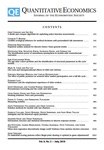
Hommes, C., Mavromatis, K., Özden, T. and Zhu, M. (2023). Behavioral learning equilibria in New Keynesian models Quantitative Economics, 14(4):1401--1445.
-
Affiliated authorsCars Hommes, Tolga Özden
-
Publication year2023
-
JournalQuantitative Economics
We introduce Behavioral Learning Equilibria (BLE) into a multivariate linear framework and apply it to New Keynesian DSGE models. In a BLE, boundedly rational agents use simple, but optimal AR(1) forecasting rules whose parameters are consistent with the observed sample mean and autocorrelation of past data. We study the BLE concept in a standard 3-equation New Keynesian model and develop an estimation methodology for the canonical Smets and Wouters (2007) model. A horse race between Rational Expectations (REE), BLE, and constant gain learning models shows that the BLE model outperforms the REE benchmark and is competitive with constant gain learning models in terms of in-sample and out-of-sample fitness. Sample-autocorrelation learning of optimal AR(1) beliefs provides the best fit when short-term survey data on inflation expectations are taken into account in the estimation. As a policy application, we show that optimal Taylor rules under AR(1) expectations inherit history dependence and require a lower degrees of interest rate smoothing than REE.